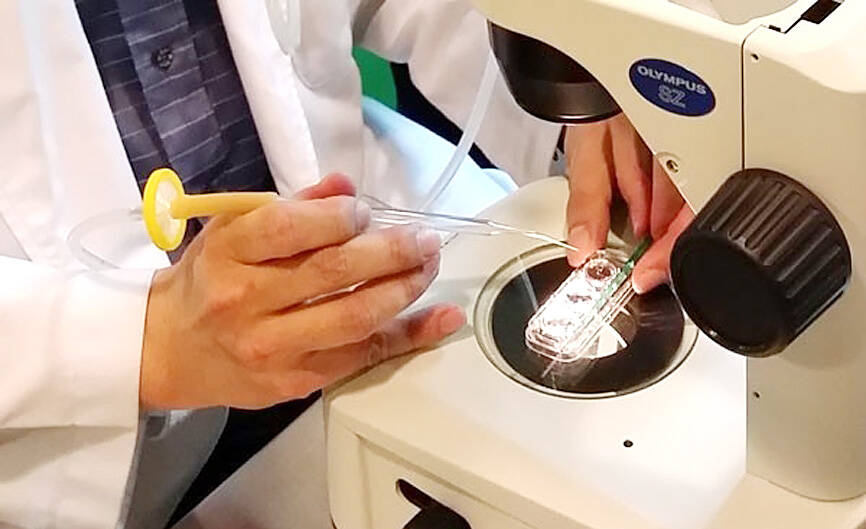The Health Promotion Administration (HPA) yesterday said that women who are planning to go overseas to donate egg cells should first understand the relevant laws in their destination country so that they do not unknowingly contravene local laws.
Many people are getting married or trying to have a baby later in life, and couples who are older or have health conditions such as infertility might need assisted reproductive technology to conceive, the HPA said in a statement yesterday.
Sometimes, couples might also need donated sperm or an egg for in vitro fertilization, it said.

Photo: Taipei Times file
There are many egg donation advertisements posted online, including ones that invite potential donors to travel abroad for an egg donation and a “nutrition subsidy,” Health Promotion Administration Maternal and Child Health Division deputy director Tsai Wei-yi (蔡維誼) said.
However, these ads do not mention whether egg donation for commercial purposes is legal in those countries, which might lead to people to unknowingly contravening local laws, he said.
For example, China prohibits any organization or individual from recruiting human egg donors for commercial purposes, so it would be illegal to travel to China for paid egg donation, Tsai said.
People who travel to the US to donate their eggs need to have a medical visa to receive treatment, so engaging in egg donation on a tourist visa would also be viewed as contravening the law, he said.
In Taiwan, donors must also donate without compensation, Tsai said, citing the Assisted Reproduction Act (人工生殖法).
However, considering that the donor must undergo certain testing and medical procedures — especially egg donors, who need to receive ovarian stimulation injections, take fertility drugs and go through an invasive egg retrieval procedure — the infertile couple can give the assisted reproduction institution a nutrition fee or supplements to be given to the egg donor, he said.
The couple can also pay for the donor’s medical and transportation fees, but the total amount of nutrition supplements and other fees should be no more than NT$99,000 (US$3,012), Tsai added.
Therefore, people who place ads to encourage others to donate eggs overseas and earn a high nutrition subsidy have contravened Article 31 of the act and might face penalties, the HPA said.
Article 31 stipulates that those who engage in the selling or brokering of reproductive cells or embryos for profit can face imprisonment for up to two years, detention or fined NT$200,000 to NT$1 million.
There are also risks of allergic reactions to ovarian simulation injections, fertility drugs or anesthetics for the egg retrieval procedure, so egg donors should consult with a doctor to know the risks before agreeing to a donation, the HPA said.
Additional reporting by CNA

US climber Alex Honnold is to attempt to scale Taipei 101 without a rope and harness in a live Netflix special on Jan. 24, the streaming platform announced on Wednesday. Accounting for the time difference, the two-hour broadcast of Honnold’s climb, called Skyscraper Live, is to air on Jan. 23 in the US, Netflix said in a statement. Honnold, 40, was the first person ever to free solo climb the 900m El Capitan rock formation in Yosemite National Park — a feat that was recorded and later made into the 2018 documentary film Free Solo. Netflix previewed Skyscraper Live in October, after videos

Starting on Jan. 1, YouBike riders must have insurance to use the service, and a six-month trial of NT$5 coupons under certain conditions would be implemented to balance bike shortages, a joint statement from transportation departments across Taipei, New Taipei City and Taoyuan announced yesterday. The rental bike system operator said that coupons would be offered to riders to rent bikes from full stations, for riders who take out an electric-assisted bike from a full station, and for riders who return a bike to an empty station. All riders with YouBike accounts are automatically eligible for the program, and each membership account

A classified Pentagon-produced, multiyear assessment — the Overmatch brief — highlighted unreported Chinese capabilities to destroy US military assets and identified US supply chain choke points, painting a disturbing picture of waning US military might, a New York Times editorial published on Monday said. US Secretary of Defense Pete Hegseth’s comments in November last year that “we lose every time” in Pentagon-conducted war games pitting the US against China further highlighted the uncertainty about the US’ capability to intervene in the event of a Chinese invasion of Taiwan. “It shows the Pentagon’s overreliance on expensive, vulnerable weapons as adversaries field cheap, technologically

NUMBERS IMBALANCE: More than 4 million Taiwanese have visited China this year, while only about half a million Chinese have visited here Beijing has yet to respond to Taiwan’s requests for negotiation over matters related to the recovery of cross-strait tourism, the Tourism Administration said yesterday. Taiwan’s tourism authority issued the statement after Chinese-language daily the China Times reported yesterday that the government’s policy of banning group tours to China does not stop Taiwanese from visiting the country. As of October, more than 4.2 million had traveled to China this year, exceeding last year. Beijing estimated the number of Taiwanese tourists in China could reach 4.5 million this year. By contrast, only 500,000 Chinese tourists are expected in Taiwan, the report said. The report